Our experienced oncologists and nurses are dedicated to developing innovative treatments designed to improve the lives of people with cancer.
Clinical Trials for Oncology
NHO Revive Clinical Trials for Cancer
Expertly conducting cancer clinical research to make precision medicine accessible to everyone. Our experienced oncologists and research staff in Nebraska bring extensive expertise from clinical and research settings, ensuring top-quality care and the highest standards of scientific data integrity. Explore our clinical trials for Oncology in Nebraska.
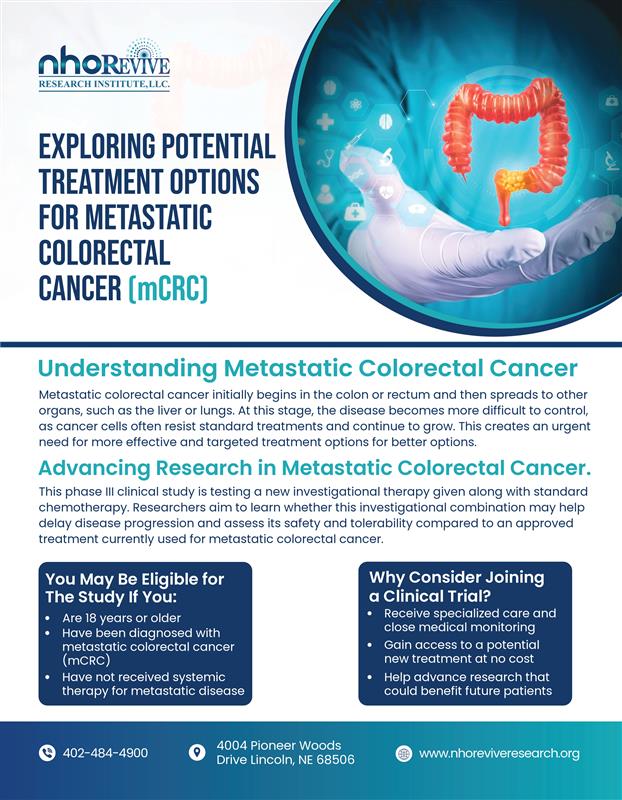
Colorectal Cancer
Colorectal cancer develops in the colon or rectum—areas essential for nutrient absorption and waste processing. Tumors here can cause changes in bowel habits, bleeding, abdominal pain, or weight loss. As the disease advances, treatment often becomes more involved and may include surgery, chemotherapy, radiation, targeted therapy, or immunotherapy. Early detection greatly improves outcomes.
NHO Revive understands the challenges faced by individuals with colorectal cancer and is committed to advancing care through clinical research. Our goal is to provide support, guidance, and access to innovative investigational therapies that offer hope for improved outcomes.
Age
18 Years or older
Gender
Both male & Female
Condition
Colorectal Cancer
Current Status
Recruiting
Location
New Bedford, MA
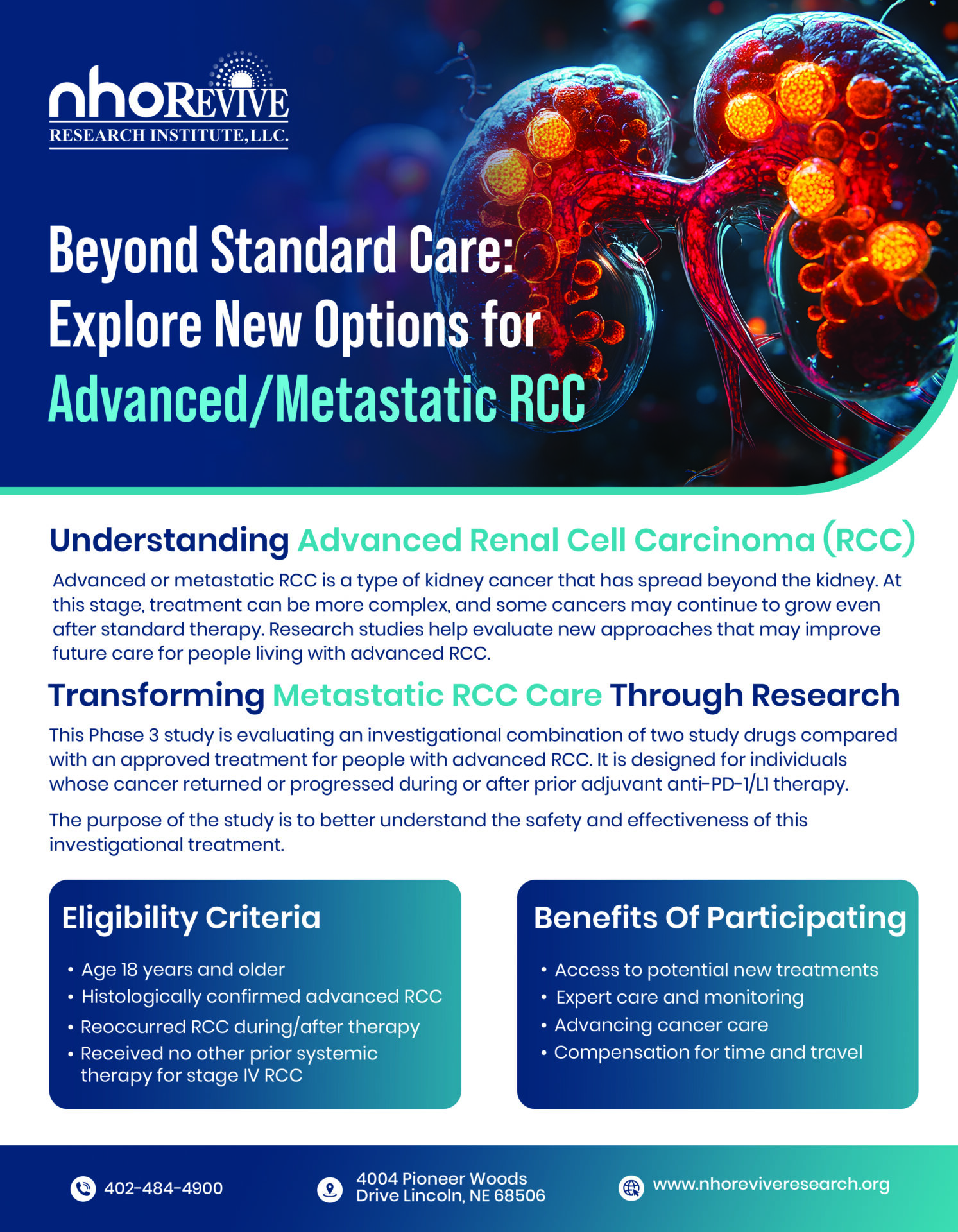
Renal Cell Carcinoma
Renal cell carcinoma (RCC) is the most common form of kidney cancer, originating in the cells that line the kidney’s filtering system. Because the kidneys play a central role in removing waste and regulating blood pressure. and maintaining overall fluid balance, RCC can greatly impact a person’s health and quality of life. When the disease progresses and spreads beyond the kidney to other organs, treatment often becomes more complex and may involve surgery, targeted therapies, immunotherapy, or a combination of approaches. Prognosis varies depending on tumor stage and individual factors, with earlier detection generally associated with more favorable outcomes.
NHO Revive understands the challenges experienced by those living with renal cell carcinoma and is dedicated to driving progress through clinical research studies. Our mission is to offer compressive care, continuous support, and access to innovative investigational treatments. By advancing new therapeutic options, we aim to improve outcomes and provide renewed hope for individuals and families affected by RCC.
Age
18 years or older
Gender
Both Male & Female
Condition
Renal Cell Carcinoma
Current Status
Recruiting
Location
New Bedford, MA
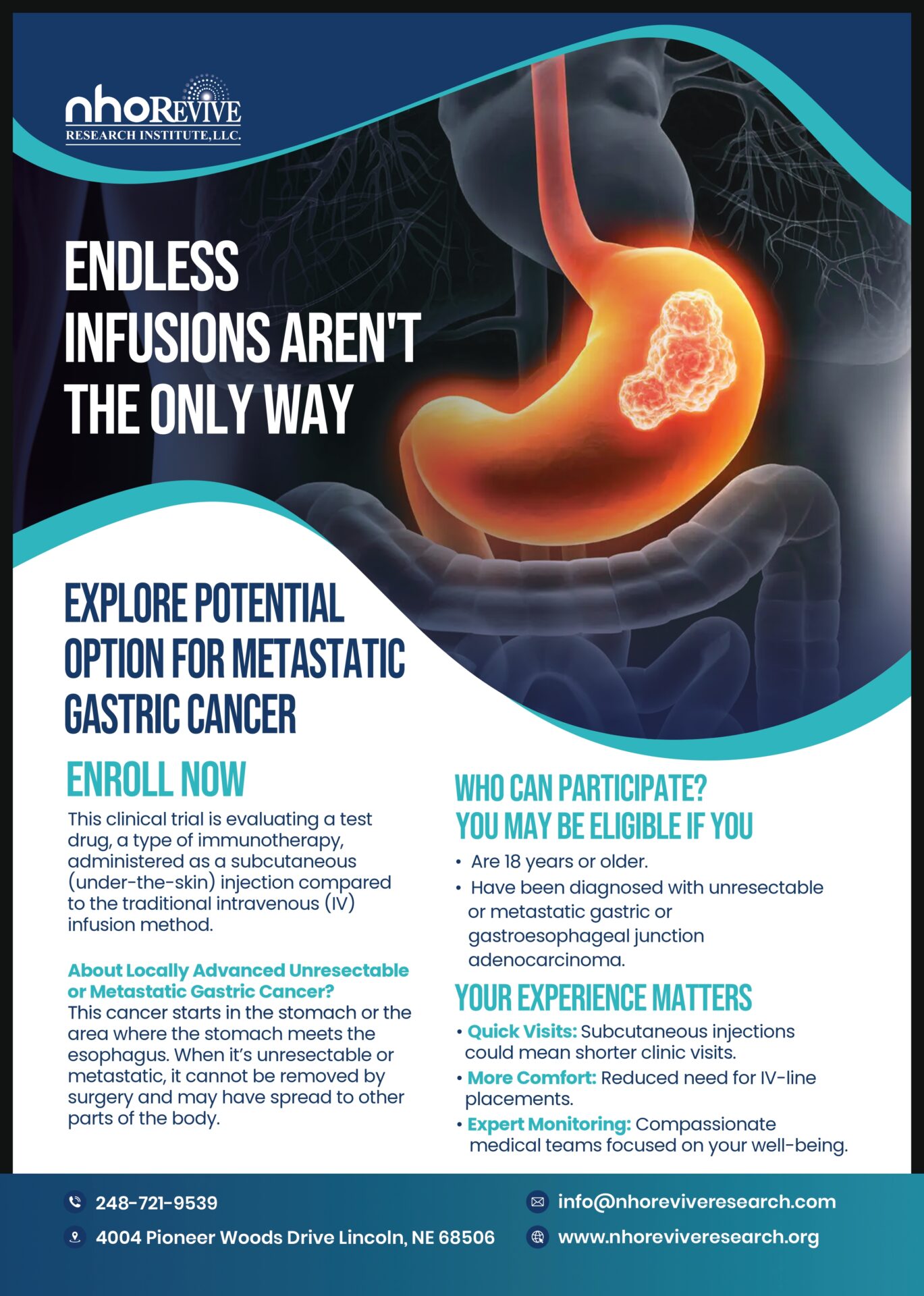
Gastroesophageal Junction Adenocarcinoma
Gastroesophageal Junction (GEJ) adenocarcinoma develops where the esophagus meets the stomach—an area critical for swallowing, digestion, and nutrient passage. Because this region is highly active and sensitive, tumors arising here can significantly affect eating, digestion, and overall well-being. As GEJ cancer progresses and spreads to surrounding tissues or distant organs, treatment typically becomes more involved and may include a combination of surgery, chemotherapy, radiation therapy, targeted treatments, or immunotherapy. Outcomes depend on tumor stage, overall health, and response to therapy, with early diagnosis offering a better chance for effective intervention.
NHO Revive recognizes the physical and emotional challenges faced by individuals living with GEJ adenocarcinoma and is committed to advancing care through clinical research. Our goal is to provide comprehensive support, compassionate guidance, and access to innovative investigational therapies. By driving progress in emerging treatment options, we strive to improve outcomes and bring renewed hope to patients and families impacted by GEJ adenocarcinoma.
Age
18 years or older
Gender
Both male & Female
Condition
Gastroesophageal Junction Adenocarcinoma
Current Status
Recruiting
Location
New Bedford, MA
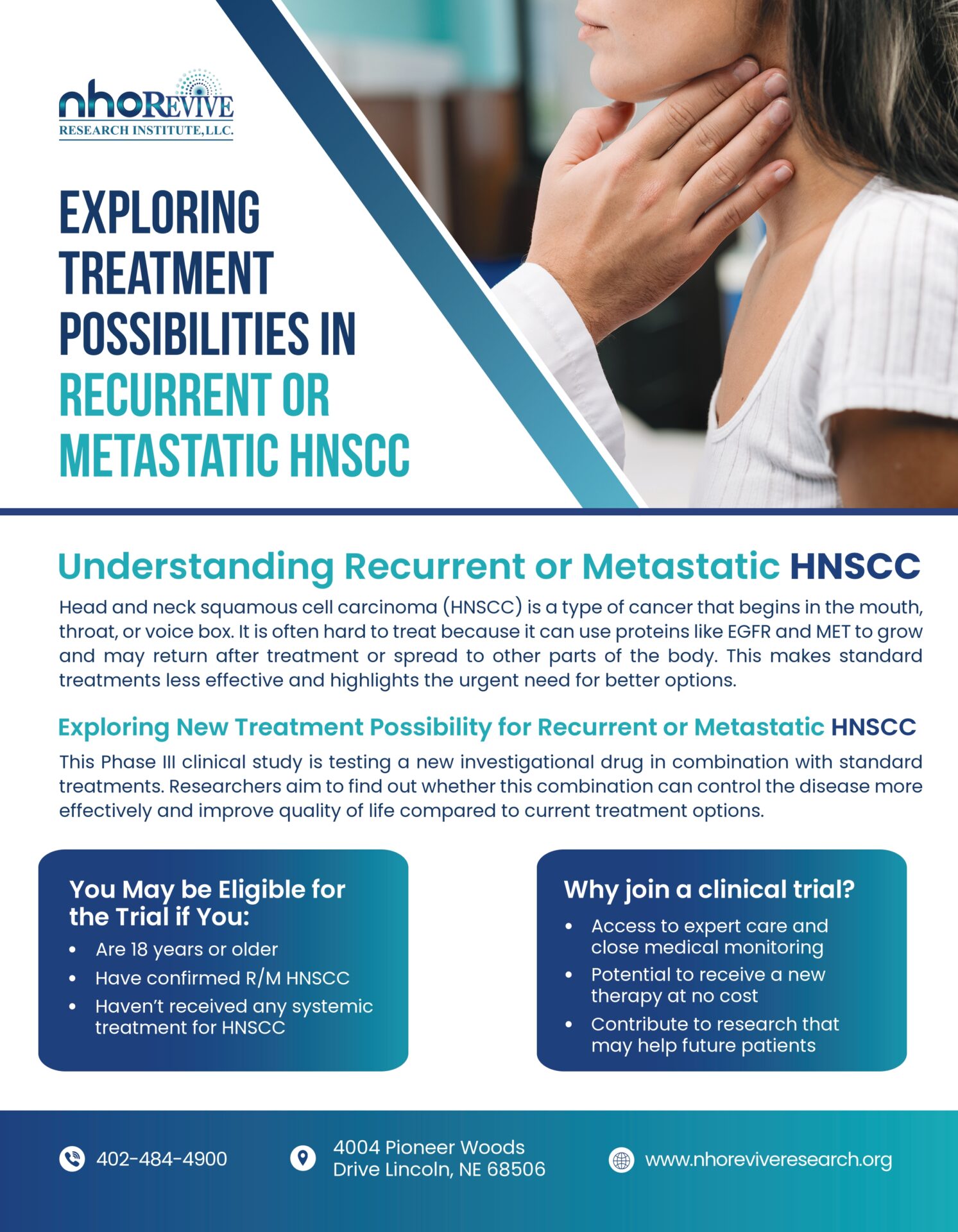
Head and Neck Cancer
Head and neck cancers encompass tumors that arise in areas such as the oral cavity, throat, voice box, nasal passages, and salivary glands. Because these regions are vital for communication, eating, and breathing, the effects of the disease can be especially disruptive. When head and neck cancer advances and spreads to distant organs, treatment becomes more complex and may require a combination of surgery, radiation, and systemic therapies. Outcomes vary by tumor location and stage, with early detection typically offering a better prognosis.
NHO Revive understands the difficulties faced by individuals living with head and neck cancer and is committed to advancing new treatment options through clinical research. We strive to provide comprehensive care, ongoing support, and access to promising investigational therapies to help improve outcomes and offer renewed hope.
Age
>18 years
Gender
Both Male & Female
Condition
Head and Neck Cancer
Current Status
Recruiting
Location
New Bedford, MA
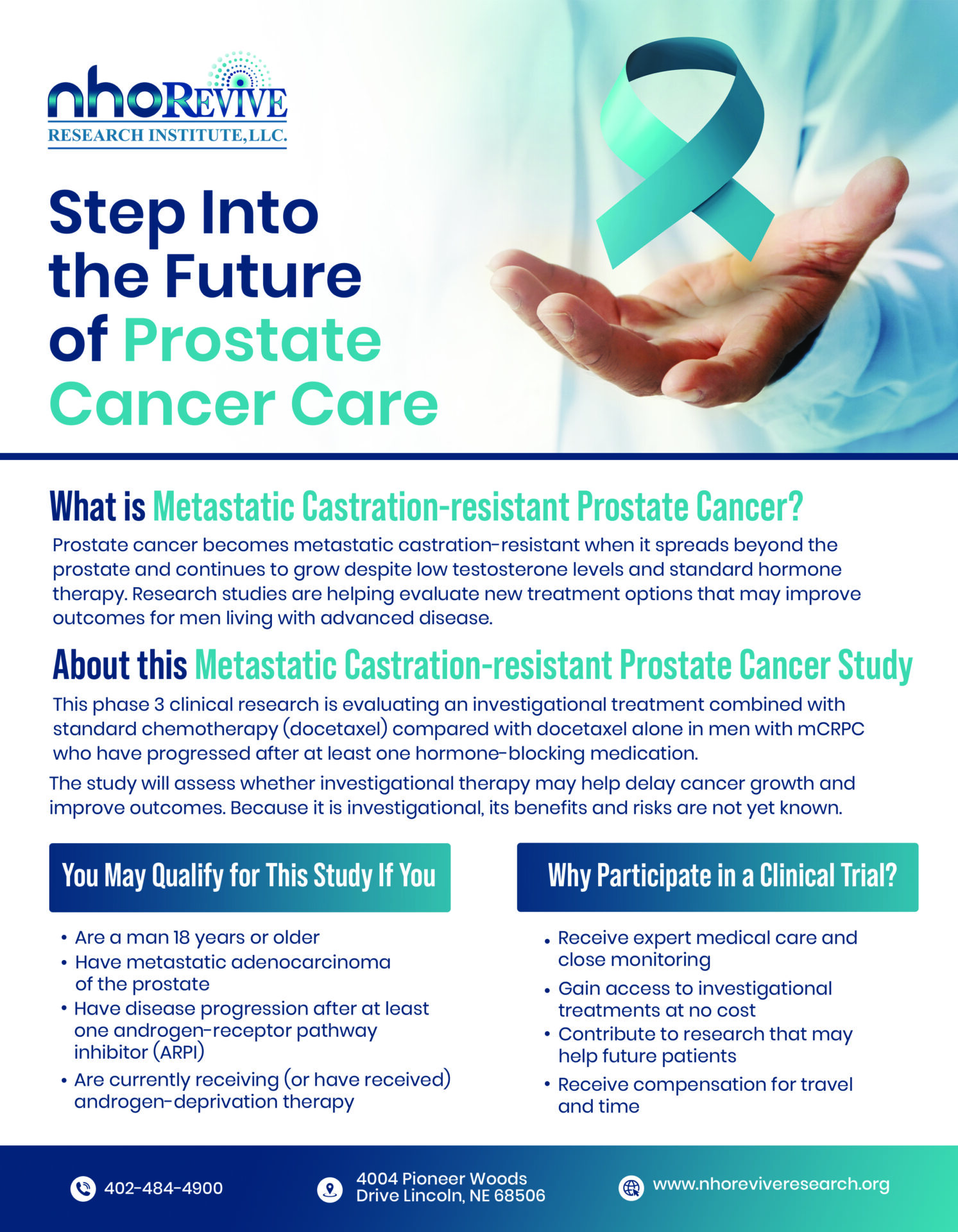
Prostate Cancer
Prostate cancer is one of the most common cancers in men worldwide.
It presents a substantial clinical challenge when cancer spreads to distant organs. This advanced form can involve the bones, liver, or lungs, complicating treatment, and making the journey especially difficult for those affected. Survival rates may vary depending on factors such as the sites of metastasis and treatment effectiveness. In contrast, prostate cancer detected early and confined to the prostate or nearby lymph nodes typically has an excellent prognosis.
NHO Revive is deeply aware of the difficulties faced by those living with prostate cancer and is actively pursuing research to identify and evaluate new therapeutic possibilities. We are committed to providing high-quality care and unwavering support throughout your involvement in our clinical trials, striving to improve outcomes and offer renewed hope every step of the way.
Age
18 Years and older
Gender
Male
Condition
Prostate Cancer
Current Status
Recruiting
Location
New Bedford, MA
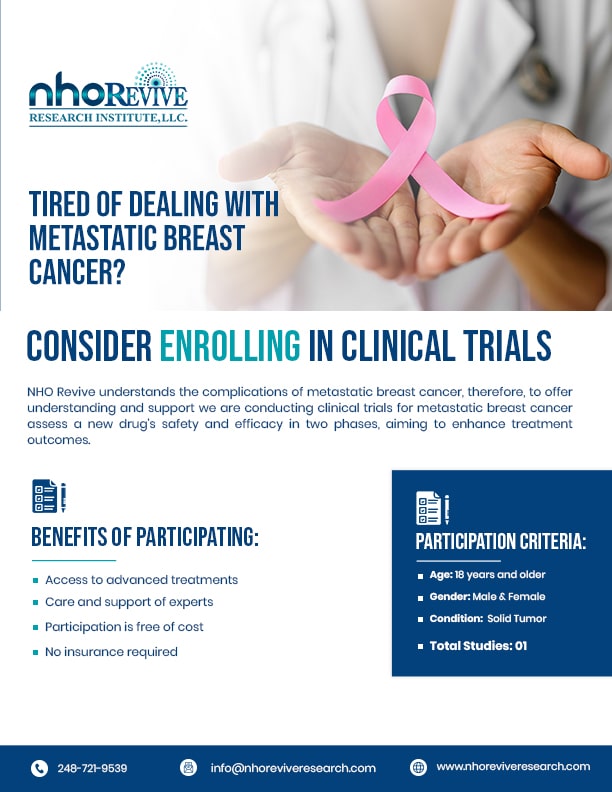
Metastatic Breast Cancer
Metastatic breast cancer, also known as stage IV breast cancer, presents a significant oncological challenge with a 5-year relative survival rate of around 27%. This aggressive form of cancer can spread to distant organs, complicating treatment and making the journey particularly difficult for those affected. Survival rates can vary based on factors like the type of metastases and treatment efficacy. In contrast, early detected breast cancer, confined to the breast and nearby lymph nodes, has a 5-year relative survival rate often exceeding 90%.
NHO Revive is acutely aware of the challenges posed by metastatic breast cancer and is actively conducting research to explore potential therapeutic options. Our commitment is to provide exceptional care and unwavering support throughout your participation in our clinical trials for cancer, aiming to improve outcomes and offer hope to those on this journey.
Age
18 Years and older
Gender
Male and Female
Condition
Metastatic Breast Cancer
Current Status
Recruiting
Location
Nebraska
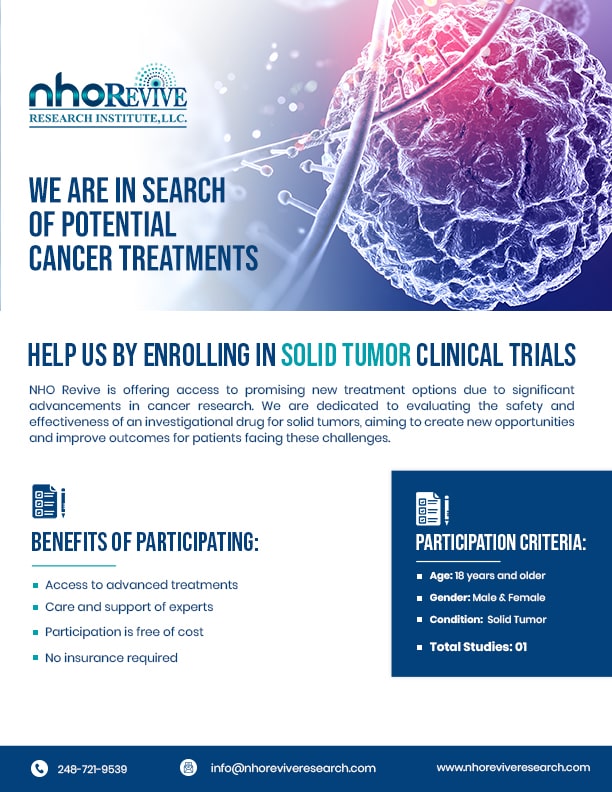
Advanced Solid Tumor
Advanced solid tumors are abnormal masses that typically lack cysts or liquid areas, accounting for approximately 90% of adult cancers. These tumors can be benign or malignant and are classified based on their originating cell type, such as sarcomas, carcinomas, and lymphomas. Unlike solid tumors, leukemias (blood cancers) generally do not form solid masses.
NHO Revive recognizes the challenges posed by advanced solid tumors and is actively conducting research studies to explore potential treatments. Our mission is to provide exceptional care and unwavering support throughout your journey in our clinical trials for cancer.
Age
18 Years and older
Gender
Male and Female
Condition
Solid Tumors
Current Status
Recruiting
Location
Nebraska
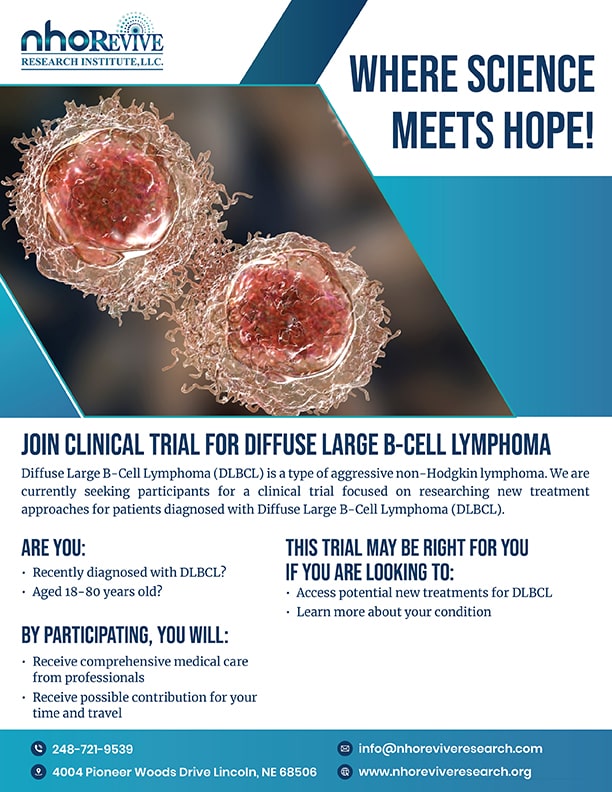
Diffuse Large B-Cell Lymphoma
Diffuse Large B-Cell Lymphoma (DLBCL) is the most common subtype of non-Hodgkin lymphoma, accounting for 85% of cases. It results from genetic mutations that transform healthy B-cells into fast-growing cancer cells, which can spread rapidly to lymph nodes and other organs. About 60-70% of patients achieve long-term remission, with prognosis influenced by factors like age, overall health, and disease stage. Early detection and personalized treatment are crucial for better outcomes. Some cases resist standard treatments, prompting researchers to explore alternative therapies.
At NHO Revive, we are committed to developing new treatments for DLBCL through innovative clinical trials. Our clinical trial for cancer focuses on creating novel drugs that target the underlying mechanisms of the disease, aiming to improve patient outcomes and offer new hope in the fight against this aggressive cancer.
Age
18 –79 Years
Gender
Male and Female
Condition
DLBCL
Current Status
Recruiting
Location
Nebraska
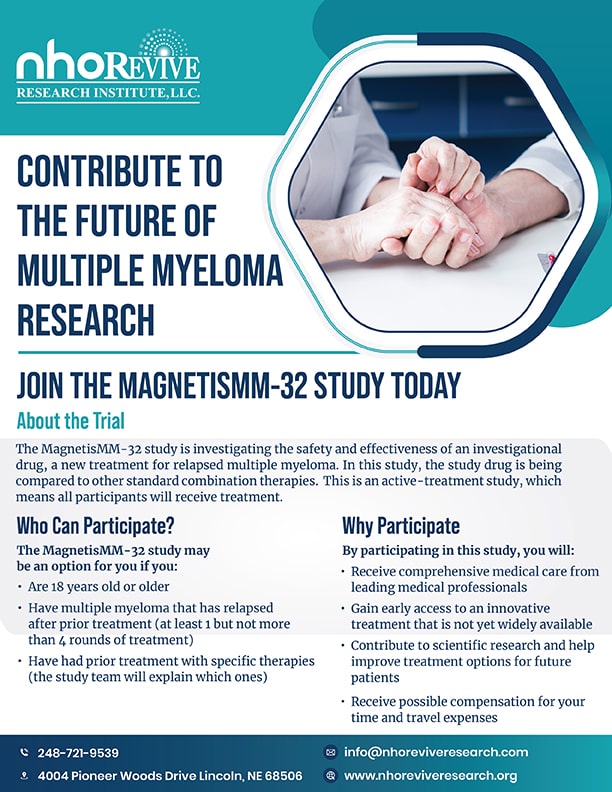
Refractory Multiple Myeloma
Refractory multiple myeloma is a type of blood cancer that begins in plasma cells, a kind of white blood cell in the bone marrow. These malignant plasma cells can accumulate, forming tumors in bones such as the spine, skull, pelvis, and ribs. The disease can progress rapidly, causing symptoms like bone pain, fractures, anemia, and kidney dysfunction.
NHO Revive is conducting clinical trials for cancer to evaluate an investigational drug for refractory multiple myeloma, comparing its efficacy to existing treatments. This research aims to determine the drug’s effectiveness and safety, potentially offering improved treatment options for patients with this form of cancer. By participating in clinical trials for oncology, patients can contribute to advancements in multiple myeloma therapy and access new, potentially more effective treatments.
Age
18 –79 Years
Gender
Male and Female
Condition
Multiple Myeloma
Current Status
Recruiting
Location
Nebraska
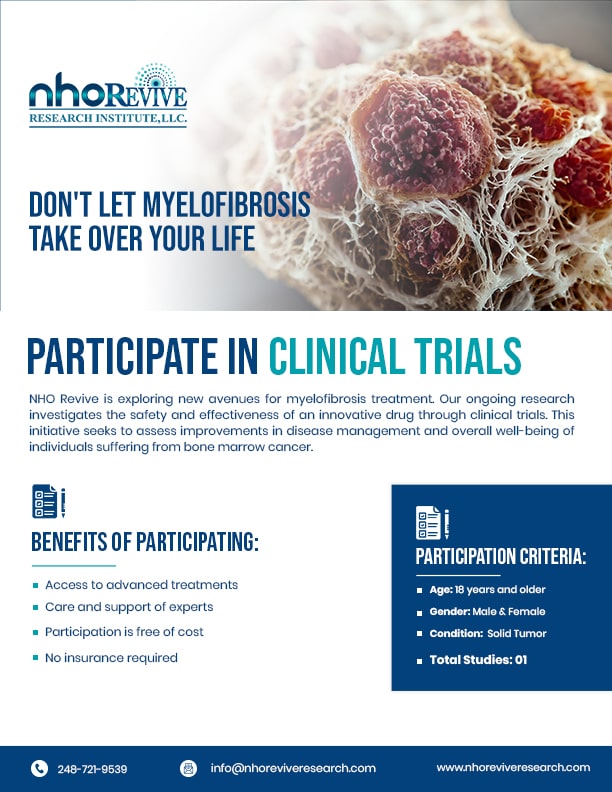
Myelofibrosis
Myelofibrosis is a rare bone marrow cancer that disrupts normal blood cell production, affecting 1 to 9 in every 100,000 people. This condition causes significant scarring in the bone marrow, leading to severe anemia, which results in weakness and fatigue. The scarring also reduces platelet numbers, increasing bleeding risk, and often causes an enlarged spleen. Myelofibrosis can occur independently (primary) or develop from another bone marrow disorder (secondary).
NHO Revive’s myelofibrosis clinical trial for cancer aims to investigate the safety and efficacy of an investigational drug with the potential to effectively target this cancer. Our commitment is to bring innovative treatments to patients, enhancing their well-being and quality of life.
Age
≥ 18 years
Gender
Male and Female
Condition
Myelofibrosis
Current Status
Recruiting
Location
Nebraska
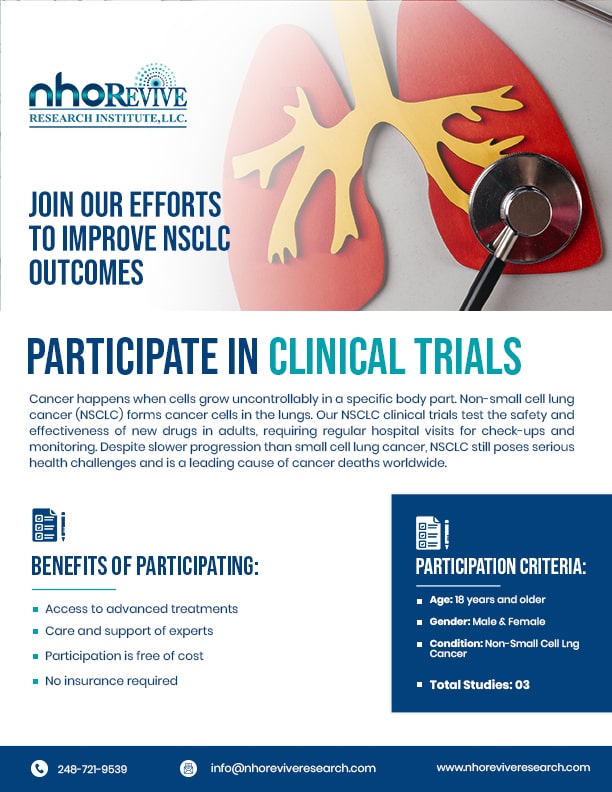
Non-Small Cell Lung Cancer
Cancer occurs when cells in a specific part of the body reproduce uncontrollably. Non-small cell lung cancer (NSCLC) forms cancerous cells in lung tissues. Our clinical trials for cancer aim to compare the effectiveness and safety of investigational drugs in adult participants against current lung cancer treatments. This study will assess changes in disease activity and associated effects.
Although NSCLC spreads more slowly than small cell lung cancer, it still presents significant challenges and is a leading cause of cancer-related mortality worldwide. Participants in our trials must attend regular hospital visits for check-ups, blood tests, side effect monitoring, and complete questionnaires. Clinical trials for cancer are essential to evaluate the treatment’s impact and ensure comprehensive care.
Age
18 years and older
Gender
Male and Female
Condition
NSCLC
Current Status
Recruiting
Location
Nebraska
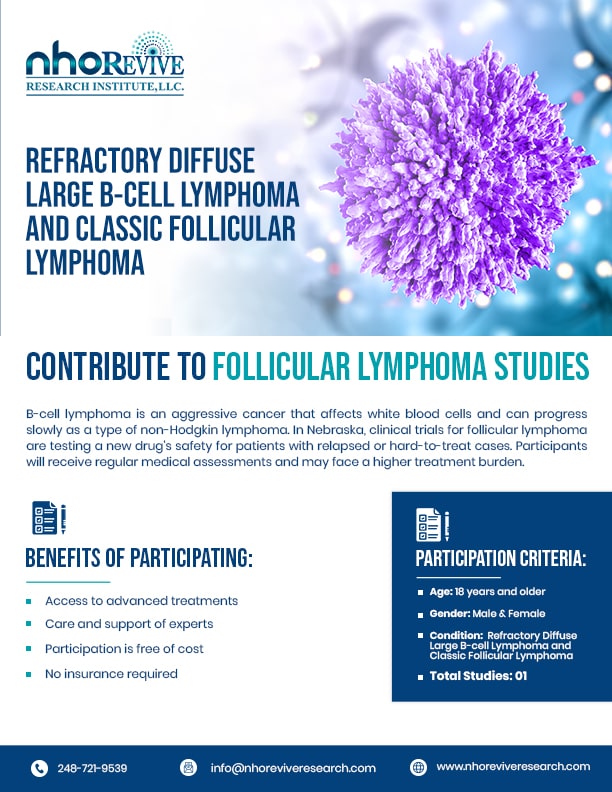
Diffuse Large B-cell Lymphoma and Classic Follicular Lymphoma
B-cell lymphoma is an aggressive cancer that targets the white blood cells responsible for fighting infections. Classic lymphoma typically grows slowly and gradually, classified as a form of non-Hodgkin lymphoma. Our follicular lymphoma clinical trials for cancer aim to evaluate the safety and efficacy of an investigational drug in individuals with relapsed or refractory diffuse large B-cell lymphoma.
Participants must have follicular lymphoma and have received at least one prior systemic therapy. These clinical trials for oncology involve a higher treatment burden than standard therapies. To monitor the investigational drug’s effects, participants will undergo regular medical assessments at an approved institution, ensuring comprehensive evaluation and safety monitoring throughout the study.
Age
18 years and older
Gender
Male and Female
Condition
Diffuse Large B-cell Lymphoma and Classic Follicular Lymphoma
Current Status
Recruiting
Location
Nebraska
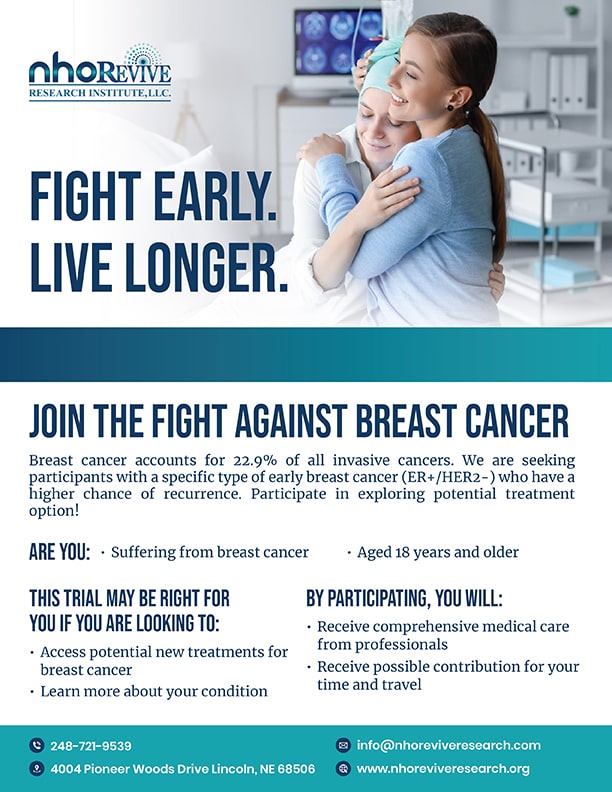
Early Breast Cancer
Early-stage breast cancer occurs when cells in the breast mutate, causing them to proliferate and form tumors. Early-stage breast cancer is localized within the breast or nearby axillary lymph nodes. This phase 3 open-label study aims to evaluate whether the investigational drug provides better outcomes compared to standard therapy for patients.
The study targets patients with early-stage breast cancer who are at intermediate-high or high risk of recurrence after initial therapy. Eligible participants must meet specific criteria to enroll. The study will track patient outcomes for up to 10 years, with a treatment duration of 7 years for each arm, to thoroughly assess the long-term efficacy and safety of the investigational drug through these clinical trials for cancer.
Age
18 years and older
Gender
Male and Female
Condition
Early Breast Cancer
Current Status
Recruiting
Location
Nebraska
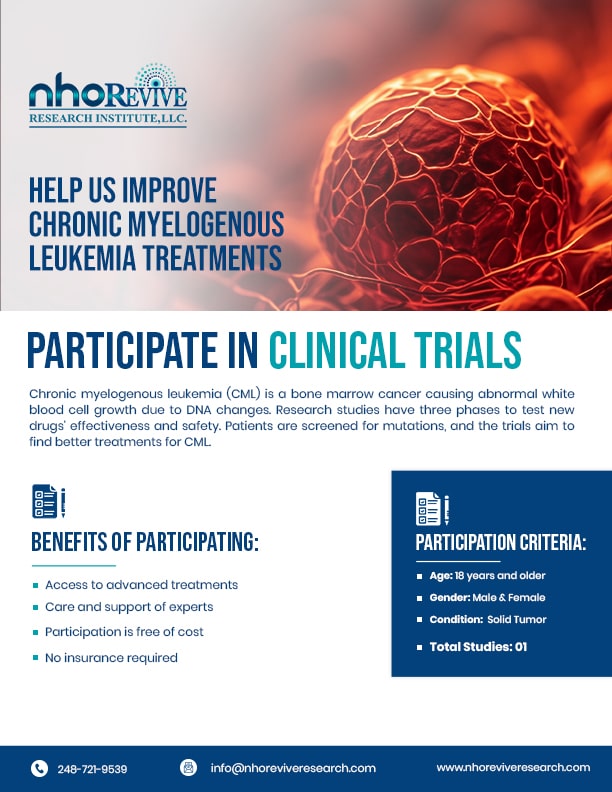
Chronic Myelogenous Leukemia
Chronic myelogenous leukemia (CML) is a cancer originating in the blood-forming cells of the bone marrow, leading to uncontrolled growth of abnormal white blood cells due to DNA changes. This CML research study spans three phases to evaluate the efficacy of the investigational drug. Patients will be screened for specific mutations and excluded if such mutations are detected.
These clinical trials aim to discover new, effective treatments for patients with bone marrow cancer. Our clinical trials for cancer involve a comprehensive assessment of the investigational drug to ensure its efficacy and safety in treating CML. By participating, patients contribute to advancing potential treatments and improving outcomes for those affected by this type of cancer.
Age
18 years and older
Gender
Male and Female
Condition
Chronic Myelogenous Leukemia
Current Status
Not Recruiting
Location
Nebraska
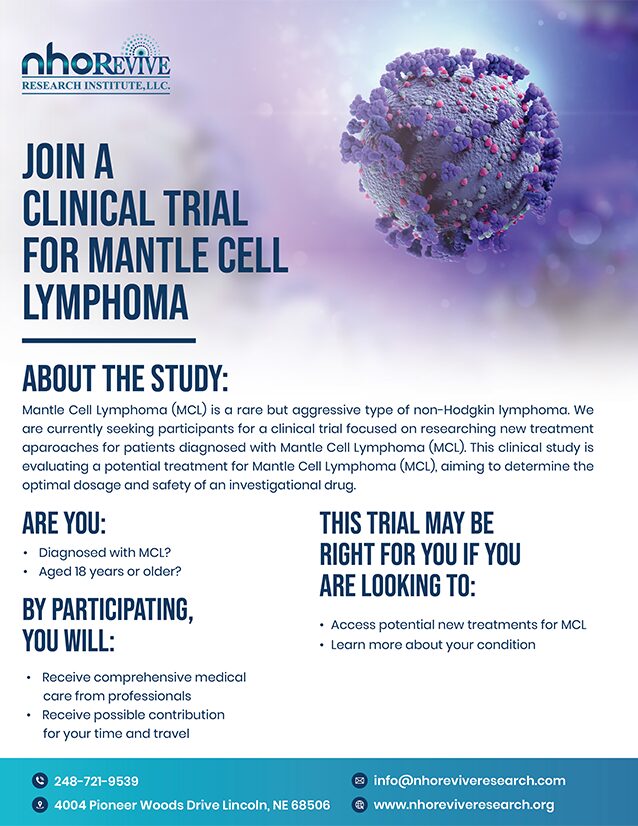
Mantle Cell Lymphoma
Mantle Cell Lymphoma (MCL) is a rare and aggressive type of blood cancer that begins in the lymphocytes, a type of white blood cell. It develops in the mantle zone of the lymph nodes and can quickly spread to the bone marrow, spleen, and other organs.
While the exact cause of MCL is unknown, it’s linked to genetic changes in lymphocytes, leading to uncontrolled growth. Symptoms may include swollen lymph nodes, fatigue, weight loss, night sweats, and abdominal discomfort.
Ongoing Mantle Cell Lymphoma research studies aim to explore new treatments and improve outcomes for patients. Clinical trials, such as MCL Clinical Trials in Nebraska, play a crucial role in advancing care by evaluating innovative therapies.
If you or a loved one has been diagnosed with MCL, exploring clinical trials may provide access to promising potential treatments for Mantle Cell Lymphoma.
Age
18 years and older
Gender
Male and Female
Condition
Mantle Cell Lymphoma
Current Status
Recruiting
Location
Nebraska
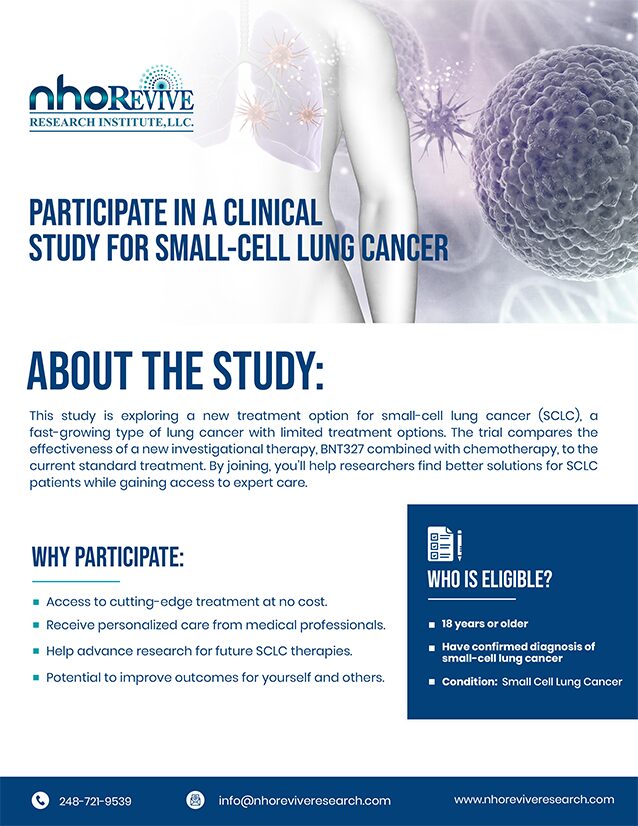
Understanding Small Cell Lung Cancer
Small Cell Lung Cancer (SCLC) is a fast-growing type of lung cancer that often starts in the bronchi and quickly spreads to other parts of the body. It accounts for about 10-15% of all lung cancer cases and is strongly linked to smoking. Due to its aggressive nature, early diagnosis and treatment are crucial.
At NHO, we are dedicated to advancing research for SCLC through innovative clinical trials. These studies explore new and promising treatments, including investigational drugs and therapies combined with existing standards of care. Our goal is to improve outcomes for patients by slowing disease progression and extending survival rates.
If you or a loved one has been diagnosed with SCLC, participating in clinical trials could offer access to cutting-edge treatments while contributing to groundbreaking cancer research. Together, we can work toward better solutions for this challenging disease.
Age
18 years and older
Gender
All genders
Condition
Small Cell Lung Cancer
Current Status
Recruiting
Location
Nebraska
Frequently Asked Questions
Want to know more about our clinical trials for cancer? Here are some frequently asked questions that provide you with a deeper understanding of this crucial field.
How can I join a clinical trial?
Talk to your doctor or search online databases like ClinicalTrials.gov for relevant studies.
Why is clinical research important?
It develops new treatments, improves existing ones, and helps us understand diseases better.
What are the phases of a clinical trial?
Phases 1-3 test safety, effectiveness, and comparison to current treatments. Phase 4 monitors after approval.
Are clinical trials safe?
Yes, they have strict protocols, informed consent, IRB oversight, and allow you to withdraw at any time.
Can I leave a clinical trial after it starts?
Answer: Absolutely. Participation is voluntary, and you can choose to withdraw for any reason.
What is an investigational drug?
It’s a medication or treatment still under development being tested for safety and effectiveness in clinical trials for cancer.




